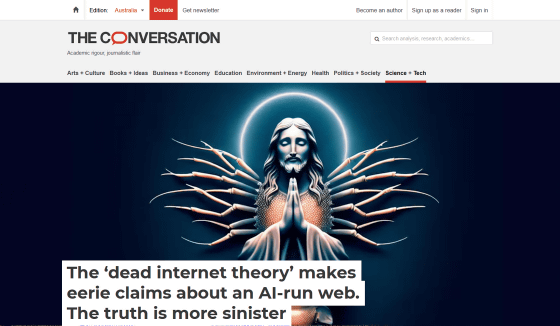Is the 'Internet Death' theory that the Internet is ruled by AI and bots true?

The 'dead internet theory' is a theory that the Internet is already dominated by AI-generated content and bots. Dr.
The 'dead internet theory' makes terrible claims about an AI-run web. The truth is more sinister
https://theconversation.com/the-dead-internet-theory-makes-eerie-claims-about-an-ai-run-web-the-truth-is-more-sinister-229609

If you are a frequent user of social media, you have probably seen accounts posting strange images and videos that are clearly generated by AI more than once or twice. Renzella and others point out that if you search for ' shrimp Jesus ' on Facebook, a large number of AI-generated 'mysterious images of a crustacean and Jesus Christ combined' will appear. Some of these images have received more than 20,000 'likes' and hundreds of comments.

Such posts are sometimes seen as evidence of the Dead Internet Theory, which holds that internet activity and content, including on social media, is generated and automated by AI and bots, obscuring the organic activity of real people.
These AI agents can quickly post AI-generated images on platforms like Facebook, Instagram, and TikTok to generate engagement. As for the 'Shrimp Jesus' image, Renzella and his team point out that the AI probably learned that images that combine absurdity and religion are more likely to go viral.
But more recent dead internet theories go further, arguing that the engagement with this content is itself generated by bots managed by AI agents: bot accounts liking and commenting on AI-generated images posted by bots, with no human interaction whatsoever.

One of the motivations for these agents to gain engagement is that they can earn advertising revenue based on social media engagement. However, these AI agents are not necessarily harmless in their efforts to generate engagement.
If an AI-driven agent can gain a large number of followers, the account is more likely to mislead human users into thinking that it is a trustworthy human account because it has so many followers. Therefore, posts that support a particular administration or attack opponents may be more likely to be perceived as authentic.
In 2022,
A study that analyzed 14 million tweets posted to Twitter (now X) between 2016 and 2017 showed that bots were heavily involved in spreading unreliable information. Accounts with large numbers of followers legitimized fake news and misinformation, encouraging human users to believe and share this content, Renzella and his colleagues said.

Renzella and his colleagues believe that the Internet is no longer for humans, but has become a place where malicious agents are using AI and bots to try to control public opinion and claims. 'The Dead Internet Theory reminds us to look at social media and other websites with a critical mind and to be skeptical. Any interactions and trends, especially the 'overall sentiment,' are very likely artificially created. They are designed to slightly change the way you perceive the world,' they said.
Related Posts:
in Note, Posted by log1h_ik







